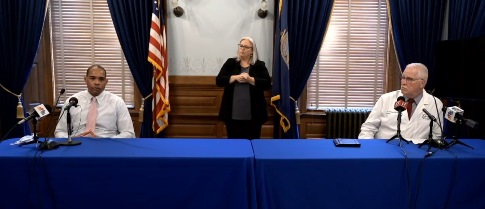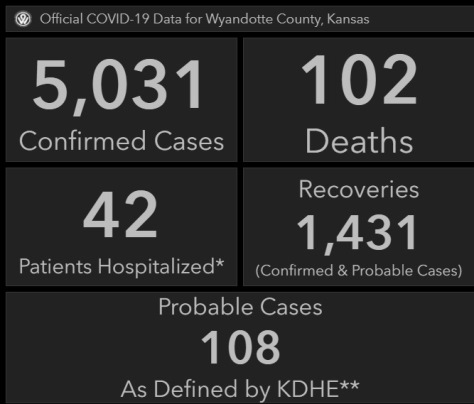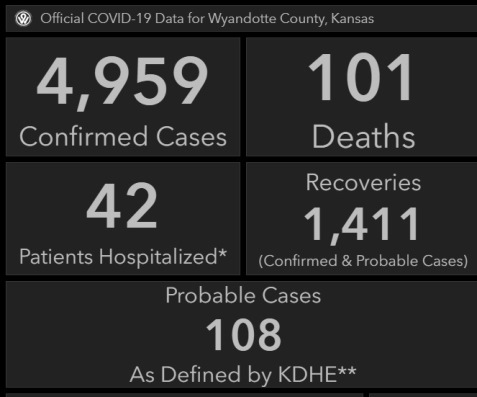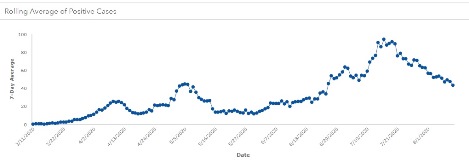Some fall sports and activities in Wyandotte County were prohibited today by a local health officer order.
The order, which goes into effect at 12:01 a.m. Friday, Aug. 14, will prohibit football, volleyball, soccer and marching band events. The order was from Dr. Allen Greiner, Wyandotte County health officer.
The order applies to public and private schools, kindergarten through 12th grade, along with higher education, non-professional sports clubs and organizations operating in Wyandotte County.
The Kansas City, Kansas, Public Schools already have suspended fall KSHSAA sports in a school board vote on Aug. 11, and it applies to football, volleyball, cross country, girls tennis, boys soccer, marching band and spirit squad.
The Turner Public Schools will comply with the order, while continuing to offer practices and conditioning, as allowed by the health order, according to a spokesman. The health order says practice and conditioning may continue in the sports if the participants can maintain 6 feet of social distancing.
Kansas City Kansas Community College already had announced on July 22 that all fall sports would be postponed this fall and winter, through a vote of the National Junior College Athletic Association membership.
A lot of schools are now discussing fall sports and are in the process of determining what this will mean for the school year, the students and families, said Janell Friesen, a Health Department spokesman.
Besides the KCK and Turner districts, the Health Department has had support from other educational leaders in the area who have worked with the Wyandotte County health officers on the issue, she said.
“I think everyone is disappointed to see a change like this,” she said. “It’s going to be a difficult change going into an already challenging school year for people. This is just a way to help prevent further spread of COVID-19, and keep the schools, students and families as safe as we can.”
“Turner USD 202 has reviewed the order related to student sports and activities. Creating an environment where students are safe and protected is our top priority. While disappointed about the prospect of not competing in contact sports and marching band, we respect the leadership of the Wyandotte County Public Health Department and their data-based approach to community safety,” said Dr. Jason Dandoy, superintendent, in a news release. “Turner USD 202 will continue to offer practices and conditioning sessions for students that comply with the order. We look forward to returning to competition as soon as safely possible.”
“The decision to suspend sports is not easy because we all understand the emotional impact this decision may have on so many of our students, their families and the range of professionals who work with them,” said Randy Lopez, president of the Kansas City, Kansas, Public Schools Board of Education. “Because the health and welfare of our staff, students and their families are paramount, erring on the side of caution is essential. The school district is committed to doing our part to reduce the spread of COVID-19 in our city, county and particularly within our district. KCKPS will continue to work collaboratively with the Wyandotte County Public Health Department as we review our options in the fall based on the status of the pandemic. We believe this conscious effort to help reduce the spread of the virus is an important safeguard to ensure a safe return to sports.”
At the Piper school district, administrators were having a meeting after receiving the health order today. There was no comment at that time.
The Bonner Springs School District, through Kaela Williams, communications coordinator, released this statement: “USD 204 is currently reviewing the Health Order issued today by Wyandotte County pertaining to athletics and activities. We remain focused on protecting the health and safety of all students and staff, and this carries over into our athletic programs. We appreciate the leadership and guidance Wyandotte County has provided through this process. The district recognizes the impact these programs have on our school community and we will continue evaluating how activities can safely be carried out this fall.”
“Ensuring the continued safety of our entire community, including students and school staff, has been and remains our top priority,” Mayor David Alvey said. “Today’s decision by public health officials, in coordination with local school districts, is intended to provide consistent guidance at all levels to reduce potential exposure and prevent another spike in the number of positives cases in our community. From the beginning, Wyandotte County has followed the advice of its medical experts, and it will continue to do so. As a school administrator for nearly 30 years, I understand the importance of sports and extracurricular activities in the formation and development of young persons. I am disappointed and saddened that our students continue to be impacted by this prolonged pandemic, both in the classroom as well as on the field and the court, and look forward to a return to normalcy not only for our children but the entire community.”
According to a Unified Government Health Department news release, Wyandotte County medical officers have relied on COVID-19 data to guide the county’s response to the pandemic. After a peak in new cases in July, the 7-day rolling averages of new positive cases have begun to decline.
This could be due in part to measures such as requiring masks or face coverings, according to the Health Department spokesman. However, COVID-19 is still very much a threat to the community, the spokesman stated.
Cases numbers are still high compared to earlier this spring, the positivity rate, which is the percentage of people tested who test positive for COVID-19, has not declined, and Wyandotte County still has the highest rate of COVID-19 in the metropolitan area, according to the Health Department.
The mask and face coverings order was issued in direct response to a spike in new positive COVID-19 cases following the relaxation of stay-at-home orders, according to the Health Department.
The mask order went into effect June 30, and another spike was reported around July 16, according to data. Since then, the numbers have decreased significantly, but are still around as high as some of the April numbers.
“Even though our rolling, seven-day average case numbers seem to be coming down, we need to do everything we can to continue that progress in slowing the spread of COVID-19 in our community. We saw a spike in the number of cases after the Stay At Home order was lifted in May, and we have continued to see more spread of the virus throughout the summer. This new guidance will help protect our students, coaches, teachers, and families, and, we hope, help prevent another spike in case numbers,” said Dr. Erin Corriveau, deputy medical officer with the Unified Government Health Department.
According to the Health Department, the new sports orders will prevent a spike i positive cases through exposure from sports and activities where it is difficult to maintain social distancing or wear masks; provide consistent guidance for all non-professional sports at all levels; and reduce the possibility of more restrictive future measures.
“We needed to provide consistent guidance for fall sports at all levels,” explained Dr. Allen Greiner, chief medical officer for the Unified Government Health Department. “We’ve seen how challenging it has been for professional sports such as Major League Baseball (MLB), the National Football League (NFL) and college football conferences to create and enforce protocols designed to protect players and coaches. If these large, extremely well-funded organizations can’t protect their players and coaches, it is unlikely that local school districts and sports clubs will be able to protect student athletes and athletic staff. That’s why this guidance covers all nonprofessional sports organizations regardless of their organizational type or status.”
There is no end date on the Health Department’s sports order, according to Friesen. It will remain in effect until conditions in Wyandotte County warrant a change or modification, she said.
“We need to keep a close eye on what’s happening with cases and spread in the community,” she said, “to determine when it would be safe to remove any restrictions.”
They will have to continue looking at the situation as they get into the winter and spring seasons, she said. The disease can change very quickly, she added.
The Kansas State High School Activities Association executive board voted July 28 not to postpone fall activities. Dr. Lee Norman, Kansas secretary of health, said on Aug. 6 that this was not likely to be successful. The Kansas Department of Health and Environment on Aug. 6 was monitoring 63 COVID-19 cases linked to sports.
Health Department officials noted in the news release that there were other outbreaks around the state and nation of COVID-19 linked to sports activities. These included
• On July 3 the University of Kansas suspended voluntary workouts because of a spike in COVID-19 cases in athletes returning to campus;
• On Aug. 5, the University of Louisville suspended all fall sports after 29 athletes tested positive for COVID-19;
• In late July, the Miami Marlins announced an outbreak involving 18 players, causing several games to be suspended and team members to be quarantined in a hotel in Philadelphia.
• As of Aug. 11, the St. Louis Cardinals had 10 players and seven staff members test positive for COVID-19, causing a two-week suspension in their games and major disruption to the shortened Major League Baseball season.
• During the week of Aug. 9, both the Big Ten and PAC-12 conferences postponed their college football seasons due to the ongoing threat of COVID-19.
The decision to restrict competitive contact sports in Wyandotte County is based both on the fact that COVID-19 remains a threat and the pragmatic understanding that many local organizations do not have the financial resources necessary to ensure the safety of children and adults, according to the Health Department.
The new health order states that a 45-person mass gathering limitation will apply to all activities and events subject to the order.
It also states that practice and conditioning in winter sports including boys and girls basketball and wrestling are limited to activities where 6 feet of social distancing can always be continuously maintained between individuals. The order also mandates frequent sanitizing and cleaning of surfaces and shared equipment.
Sports and activities that are allowed during the fall sports season include debate, speech, tennis, gymnastics, golf, cross country and other non-contact spirit activity, provided they adhere to the guidelines of the KSHSAA Activity Specific Risk Management Considerations manual, according to the health order.
The new health order says that masks are mandated whenever a 6-foot space cannot be maintained. Also, violation of the order carries a misdemeanor charge with a maximum fine of $500 and a 30-day jail sentence, according to the health order.
Details from the new local health order include:
- Competitions for football, volleyball, soccer and marching band are prohibited.
- Practice and conditioning activities in such sports may proceed in the event 6 feet social distancing can always be continuously maintained between individuals.
- Practice and conditioning in the winter sports of boys and girls basketball and wrestling are also limited to activities where 6 feet social distancing can always be continuously maintained between individuals.
- Sports or activities during the 2020 fall sports season such as debate, speech, tennis, gymnastics, golf, cross county, or other non-contact spirit activity are allowed provided they adhere to the guidelines in the KSHSAA Activity Specific Risk Management Considerations manual.
- Frequent sanitizing and cleaning of surfaces and shared equipment is required.
- Masks must always be worn by athletes and coaches indoors; and outdoors during practice or competition when 6-foot distance cannot be continuously maintained.
- All schools and non-professional sports organizations visiting Wyandotte County for competition must strictly adhere to all Wyandotte County local health officer orders.
- It is the responsibility of the host school or non-professional sports organization to inform the visiting team of this and all related local health officer orders.
- Non-participating individuals attending indoor practices or competitions must adhere to social distance practices and mask wearing mandates for indoor functions.
- Non-participating individuals attending outdoor practices and competitions must wear masks in situations where social distancing cannot be maintained.
AG opinion says school boards can have final say
The largest school districts in Wyandotte County have already made their decisions to either lead or follow the health department’s order on limiting fall sports, so a new opinion from the state attorney general could be a moot point for most students in Wyandotte County.
The Kansas attorney general on Aug. 11 issued an opinion that says school boards can make their own final decisions about whether or not to have sports, and also about whether or not to wear masks and implement other health orders.
According to the attorney general’s opinion, county commissions have authority over the health orders in their counties, while school boards have the authority over the health measures at their schools.
Friesen said they will need to look at the opinion and consult with their legal department and colleagues before making any comments about the attorney general’s opinion.
An AG opinion is considered to be stronger than an individual attorney’s opinion, but not as strong as a court ruling.
Doctors point out the changing nature of information about COVID-19
During a news conference on Thursday morning, doctors at the University of Kansas Health System pointed out that information about COVID-19 is constantly changing. That includes information about youth, athletes, sports and COVID-19.
Earlier, experts thought that youth were not very susceptible to COVID-19, but hospitals have been seeing some young patients admitted for it, according to the doctors. While the numbers may be fewer than adults, there are still some cases involving children.
Dr. Tim Beaver, sports cardiologist, said Thursday morning at the KU Health System news conference that a condition called myocarditis, inflammation of the heart, has developed in some patients after they have contracted COVID-19.
Doctors can’t really tell athletes at this time how safe it is to resume sports after they have contracted COVID-19, according to Dr. Beaver. There are studies being conducted currently that may answer some of the questions about it later, he said.
Myocarditis and other effects of COVID-19 have been one of the reasons that colleges and the pros are conducting periodic COVID-19 testing on athletes.
The doctors today said they don’t have all the information now to tell athletes when it will be safe to return to their sport. They also said since some COVID-19 patients are asymptomatic, athletes may not know that they’ve had it and may not know if they have developed myocarditis.
Some of the professional teams have enough funding to monitor the health of their athletes closely, which is not always possible for amateur teams and high school teams.
It’s becoming necessary for doctors to help athletes look at the risk and benefits of playing sports in these times, according to the doctors. If athletes have already had COVID-19, some of the doctors would recommend that they sit out this season.
The doctors also discussed confusion that some post-COVID-19 patients have, and also concussions.
Dr. Steve Stites, chief medical officer at the KU Health System, said there were emerging therapies being developed every day, and the pandemic probably won’t be long-term. It sometimes takes time for the body to recuperate fully, he added.
The new health order concerning sports in Wyandotte County is at https://alpha.wycokck.org/files/assets/public/health/documents/covid/08132020localhealthofficerorderregardingsports.pdf.




